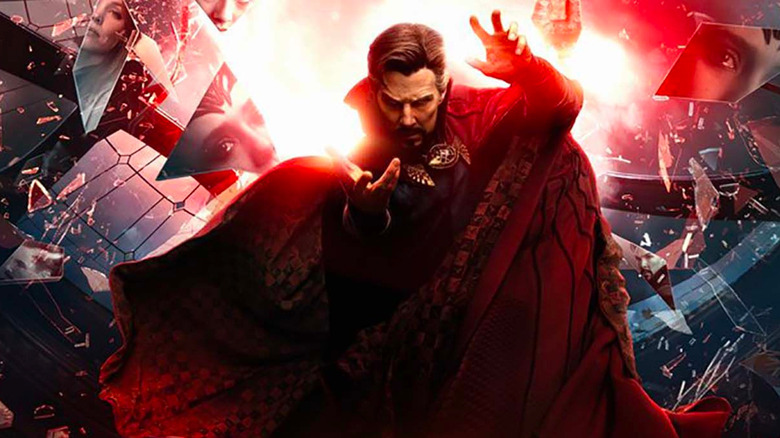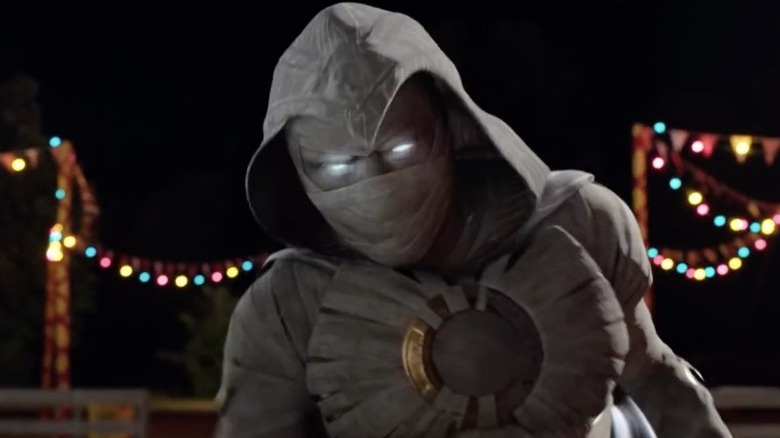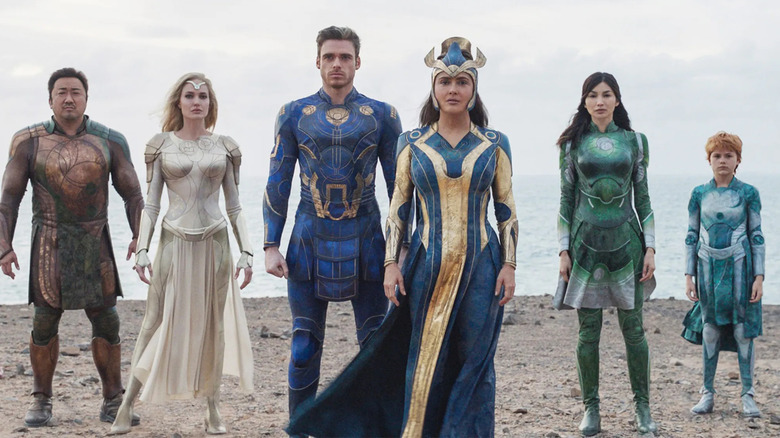Doctor Strange 2 Reveals There Are Two Kinds Of Superhero Movie Viewers
Spoilers follow.
Something odd happened to me last week as I watched "Doctor Strange in the Multiverse of Madness." As I cheered, other audience members groaned. When I was inert and unreactive, they yelled and clapped. Our laughs and gasps, I discovered, were just as out of sync as our applause. At first I thought the audience I saw the movie with may have just been an exception, but after watching the inevitable post-movie discourse unfold online throughout the weekend, something became clear: Marvel's target audience has reached a fork in the road, and the two paths we're hoping to walk are starting to seem very different.
As the Marvel Cinematic Universe digs further into the comic canon, further beyond the headliners like Captain America and Iron Man, the franchise has an opportunity to do something new with its lesser-known properties and long-awaited deep dives. Stylistically, "Doctor Strange in the Multiverse of Madness" is one of the most interesting movies ever made under the MCU banner. It's bold, gory, scary, and filled with director Sam Raimi's signature artistic flourishes. Yet the response to the film has been decidedly mixed. After just a few days in theaters, it's already tied for the second-lowest CinemaScore grade of any Marvel film, with only last year's "Eternals" beneath it.
Though CinemaScore doesn't poll viewers of TV shows, I expect that Marvel's latest series, "Moon Knight," would garner similar responses (the series has a 92% Rotten Tomatoes audience score, but that can be submitted before viewers see the whole show). What do all of these titles have in common? They're trying something totally new. Not only are the films and shows in the recent MCU slate opting out of the studio's visually nondescript house style, but they're also offering up narrative and plot surprises that even the most studied comic book fans can't predict ahead of time. Surprises, it turns out, might not be what everyone's looking for.
Is the MCU built to be surprising?
"Doctor Strange in the Multiverse of Madness" could well be remembered as the litmus test for audiences as the MCU enters its next era. It's designed to shock, not because it wants to be mean to people who feel protective of their favorite heroes, but because Raimi simply enjoys a good cinematic thrill–and plenty of moviegoers do too.
In one of the movie's most talked-about scenes, Doctor Strange (Benedict Cumberbatch) comes face to face with The Illuminati, an alternate universe band of heroes that includes, among others, X-Men leader Charles Xavier (Patrick Stewart) and The Fantastic Four's Reed Richards (John Krasinski). When the heroes are introduced, they're clearly meant to elicit screams and applause. For all we know, this could be introducing a whole new era of heroes in the MCU! But then, in a show of disturbing, epic force, Darkhold-influenced Scarlet Witch (Elizabeth Olsen) slaughters the entire team, shredding Richards to pieces and snapping Professor X's neck.
For me, this scene reads as a deliciously twisted subversion of our expectations. Blockbusters tend to follow familiar beats, so anything that can pull gasps — not of confirmed anticipation but of pure shock — is a breath of fresh air. In a franchise that kept all its major heroes shiny and unscathed for nearly a decade, it's a reminder that heroes die. The move works on plenty of other levels, too, demonstrating the depths of Scarlet Witch's fury, the endless possibilities of the multiverse, and the power of really cool-looking special effects. Yet, while I was screaming in surprised joy at Black Bolt's (Anson Mount) sudden, explosive end, plenty of others apparently felt slighted. The consensus among a vocal portion of fans (and press) seems to be that these characters deserved better, and that the film's dip into the multiverse would have only been worthwhile had it produced even more cameos, character set-ups, cross-overs, and Easter eggs.
Sometimes, it seems like superhero movies train viewers to watch their properties like connect-the-dots games rather than actual movies. A constant barrage of trailers and tidbits and a strong culture of fan participation have made major Marvel fans feel like accomplished investigators, but it's also had unintended results. What happens if the movie you got doesn't feel like the movie you built up in your head in the months leading up to it? What do you lose when you can't leave a theater feeling like an expert in what you just witnessed? And on the flipside, is a movie actually any good if it's only coherent and enjoyable for well-read superfans?
Moviegoing with prerequisites
These are questions fans of all stripes will have to reckon with as the MCU wears on. The latest batch of Marvel stories, including "Eternals," the Disney+ shows, and the new "Doctor Strange," all swing for the fences in bold ways. They're by no means perfect, but their formal elements and performances all crackle with an energy that too much of the MCU has been missing. The polarizing response to each feels like an indicator that this franchise isn't particularly adept at pleasing both movie lovers and Marvel lovers alike. Still, as the biggest moneymaker in the industry, Marvel could've easily spent a year or two post-"Endgame" taking a few fan service-heavy victory laps if it wanted. Instead, execs pulled the trigger on collaborations like Sam Raimi and Chloe Zhao, and the franchise is more interesting because of it.
In times like these, it's worth asking what we want out of our blockbusters. Just as some superhero comic fans might get frustrated with movies that don't match up with the conclusions they've drawn based on months of rumors and carefully scrutinized promos, I get frustrated when I can't find a movie that's unique enough for me to enjoy without knowing about any of that. Sure, supplemental materials can enrich a viewing experience, but enjoying a trip to the theater should not require prerequisites. Yet in an IP-driven blockbuster landscape, it seems like we're increasingly encouraged to get off on the speculation-driven foreplay rather than the main event. When the main event turns out to be something wildly off-book and unpredictable, as in the case of "Doctor Strange in the Multiverse of Madness," it's bound to be a thrill for some and a turn-off for others.
We've arrived at an era in which superhero movies and the corporations that pump them out are larger than life, which you'd think would mean there's something for everyone. The conversations surrounding Marvel at times seem to be driven by protective comic-lovers who remain stubbornly incurious about the craft of film, and about the originality and cinematic serendipity an on-screen retelling can provide. Or maybe I'm the naive one for hoping to enjoy a movie on its own merits in a franchise that, 28 movies in, mostly demands and rewards cross-text examination. Either way, Marvel's seemingly infinite multiverse of properties seems like it should be big enough for both of us.


